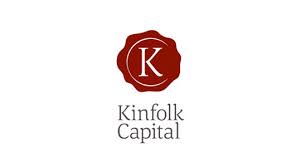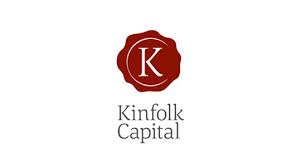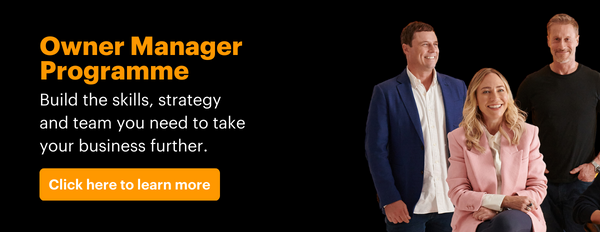
Name: Mark Lewis & Ross McConnell
Business: Kinfolk Capital
Industry: Business Services
Programme: Owner Manager Programme, 2009

It was a case of timing for Mark Lewis when he started the Owner Manager Programme in 2009. Originally making the decision to go on the programme in 2007 when things were going pretty well for his business, City Motor Group – he expected to join with the purpose of continuing to grow the business. However he delayed joining the programme when the Global Financial Crisis hit in 2008, things changed and the situation was no longer about growing – it was about breaking even.
“We felt we needed to keep our head above water at that stage, but as soon as we started the programme in 2009, within three months we had sorted our issues out and were back on track to grow the business,” says Mark.
Mark says the calibre of the facilitating team ensured he could turn his business around. “I was fortunate enough to have David Irving facilitating my group. We went through an overview of the business and the challenges we faced. I thought I had everything covered, but David had an uncanny way of pointing out the parts where we needed help,” says Mark. “David helped us to create a plan to sort ourselves out. We got our funding in order, and talked to BNZ – it’s hard to find that kind of good advice and help when you’re running a business.”
Mark says having this kind of input was invaluable – especially when he was making the business decisions alone. “In the past I had been involved with a lot of different businesses, dealing with a number of people. When you own your own business, you don’t get that same amount of contact and people to offer advice. I found I was feeling isolated,” he says. “The Icehouse programme allowed me to get back in that ‘loop’ of engaging with other business owners and professionals and meant I established an excellent network which I keep in touch with.”
The structure of the programme worked well for Mark and allowed him to implement consistent change in his business.
“I enjoyed taking three days away from the business, knowing that the focus was going to be on me in the business and the business itself, nothing else,” he says. “The way the course is structured meant you had ‘homework’ – which I never dreaded doing, it kept you focused and returning each month gave you deadlines to work toward to make positive change happen.”
Mark says the content was refreshing and helped him with planning for his business. “Being in a group allowed me to see how other people approach things which I found really interesting. The discussions which took place gave me a great opportunity to pick up ideas on how I could plan for the business,” he says.
Mark thrived in surrounding himself with other business owners and found the networking part of the course both enjoyable and valuable to himself and the business. Since completing the programme, Mark’s business has gone through a major rebranding. “The re-brand is really exciting for us. It’s been a years’ worth of planning and executing, it has worked very well,” he says.
“It’s been an amazing exercise and we have another business about to re-brand off the back of that experience.”
Mark has changed his whole business model dramatically. His focus which was once on the diminishing wholesale side of the business has shifted to a focus on retail. “Our volume has gone down and we’ve recreated how we operate and how we work. I’ve used Icehouse facilitators in this process to get feedback and input to help us succeed,” he says. Mark has not only changed his business for the better as a result of the Owner Manager Programme, it also presented him a new business opportunity too good to pass up.
Opportunities don't shout, they whisper
“As we were getting together for three days each month, naturally a big part of the experience was socialising in the evenings,” he says. “Talking to the others on the programme we all agreed that we were pretty good at running businesses so we thought, why don’t we get one together.”
Mark says it was a bit of a laugh at first – a joke around raising funds to pay for the group’s social get-togethers going forward. “We decided it would be worth having a proper meeting around how it could happen. Myself and another programme participant Glen Beal did some background work on what was viable and we decided to set up a meeting in New Plymouth,” he says. “We looked at our three options – we could develop a small business, a medium business or a large business. We all agreed a small or medium business would require a lot of input with not much return, but a large business meant we could employ management and get a good return.” “It came down to basing our decision around dollar points, so everyone agreed without question – we had to go for something big,” he says.
Kinfolk Capital
Mark and the group got underway with their planning. They developed a set of criteria of what they were looking for and during this time met the future CEO of their business – Ross McConnell.
Ross had returned to New Zealand after five years abroad with a strong drive to support the development of local firms into international markets. Ross had been CEO of Kea and a director on its board. Ross says he saw a lack of awareness among Kiwi business leaders about the huge amount of value which can be gained from engaging networks with serious intent.
The group recognised the private equity market for smaller-mid-size business was virtually non-existent in New Zealand.
“We saw many established, profitable businesses with high-growth potential that would benefit from an injection of new capital and capability,” says Ross.
The group decided to pursue investment opportunities in established businesses. However the early stages of the business came with challenges. Attempting the first investment in difficult trading conditions proved costly and unsuccessful.
Despite the setback, a strong support and advisory network provided the drive to continue working together. “We still believed in the value of supporting mature and growing New Zealand SMEs and decided to dig in and follow through with the job despite the initial setback,” says Ross.
Kinfolk Capital was the ‘silver lining’ which came out of losing the first deal the group worked on together.
“By forming Kinfolk Capital we set up an organisation with the resource and capability to source, screen and complete investment opportunities on behalf of us and our coinvestors,” says Mark.
Mark says it’s been a long journey to get where they are today. “It’s taken four years, we’ve spent a truck load of money but we’ve learnt a lot along the way.” Kinfolk announced its first investment in a successful, established Kiwi business in May 2013. The business acquired a 33.3% stake in CMS Alphatech Ltd – a sector leader in the Australasian healthcare market.
“Kinfolk has received support from BNZ Retail, Private Banking and Partners and was pleased to have BNZ involved in the funding of the acquisition of CMS Alphatech Ltd – a long standing BNZ Partners customer,” says Ross. Ross says Kinfolk is actively seeking new investment opportunities and is now in an interesting phase of understanding how the business networks within the group can support the future development and growth of the business.
“Networking is an essential part of the business development and capital raising process, but is an endeavour that only favours the brave and well-prepared,” he says.



